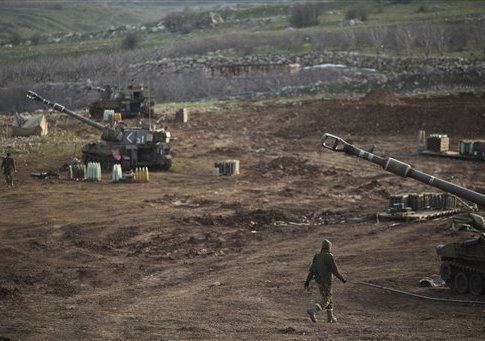JERUSALEM—The strategic threat posed to Israel by Iran’s nuclear program is being augmented by a new and no less ominous threat: the presence of Iranian ground forces adjacent to Israel’s northern border.
The Arabic-digital news site, Rai-al-Youm, reported this week that Iranian troops have been participating, together with Hezbollah and the Syrian army, in an attempt to drive rebel and jihadi forces from southern Syria, where they dominate a triangle of territory between the Golan Heights, the province of Daraa on the Jordanian border, and the outskirts of Damascus.
"This is the first time we have a public operational intervention by IRGC [Iran’s Revolutionary Guard Corps] forces in the conflict," the report said. Several media outlets have reported the presence in the battle area of Qassem Suleimani, the commander of the IRGC al-Quds force, which is responsible for operations outside Iran’s borders.
Iran, which has been attempting to build its sphere of influence from Somalia to Afghanistan, has been particularly successful in Syria, where it has become a major prop for President Bashar al-Assad, and in Lebanon, where Hezbollah has become a formidable proxy. Iranian military advisers have been active in both areas for years, but the presence of Iranian troops on the ground–even in small numbers–is little known.
In a recent bulletin, the Middle East Media Research Institute (MEMRI), which monitors media throughout the region, reported that the Iranian military presence in the region has hitherto been in the form of command posts and a limited number of special forces. It notes that according to a plan outlined by a senior IRGC official on an Iranian website last year the command posts are intended to operate "130,000 trained Iranian Basij (a volunteer militia) fighters waiting to enter Syria." The authors of the MEMRI report, Yigal Carmon and Y. Yehoshua, said the statement was immediately removed from the site after publication.
Syria’s Al-Hadath website, which is close to the regime, recently revealed Iran’s active involvement on the regime’s side in the civil war.
"Iran, which had been taking part in the fighting in Syria by means of military advisers, recently decided to join the military conflict officially and openly," it declared.
The presence of Iranian military personnel near the Golan border was revealed last month when an Israeli aircraft, in a targeted strike, interdicted two SUVs apparently reconnoitering the border area from the Syrian side. Twelve were killed in the strike, six of them Hezbollah fighters and six of them Iranian military personnel.
Although Iranian leaders frequently call for Israel’s demise, the authors note that fomenting action against Israel by proxies such as Hezbollah stems from Iranian strategy, not just ideology, since it is believed to create deterrence against an Israeli strike on Iran’s nuclear facilities. This presumed deterrence would be reinforced by the creation of another point of conflict on Israel’s Syrian border.
The MEMRI authors say Teheran also has domestic considerations in its operations beyond its borders.
"Mobilization of Iranian national forces and Iranian youth in the ideological framework of struggle outside Iran inoculates Iran’s dictatorial regime against internal uprising and rebellion," according to the authors. The authors add that Iran’s involvement on Israel’s northern front together with its deep involvement in Syria and elsewhere "creates tremendous pressure on its dwindling resources and exhausts it, intensifying its dependence on regional forces."
Hezbollah leaders recently declared their intention of creating another front inside Syria, presumably with President Assad’s assent, opposite the Golan. After last month’s air strike, Israeli Defense Minister Moshe Ya’alon indicated that the strike was intended as a statement that Israel would not permit Hezbollah and its Iranian mentors to open a new front.
Israel has established a working relationship with rebels and even, reportedly, with jihadi militias who have been operating near the Golan border—treating wounded and providing humanitarian aid in return for keeping the border quiet.
